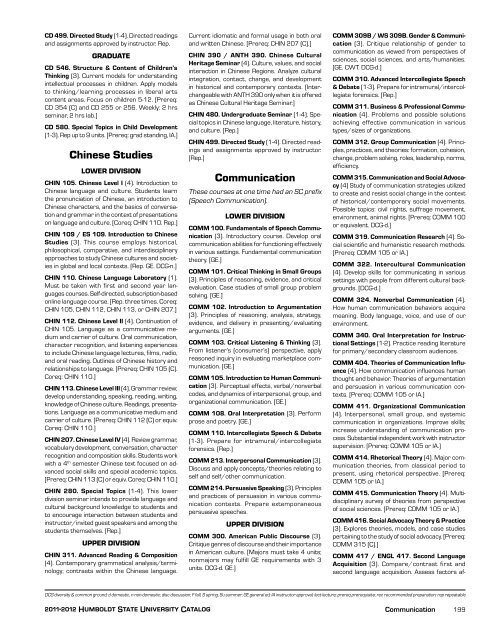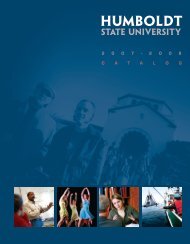2011-12 Academic Year - Bad Request - Humboldt State University
2011-12 Academic Year - Bad Request - Humboldt State University
2011-12 Academic Year - Bad Request - Humboldt State University
You also want an ePaper? Increase the reach of your titles
YUMPU automatically turns print PDFs into web optimized ePapers that Google loves.
CD 499. Directed Study (1-4). Directed readings<br />
and assignments approved by instructor. Rep.<br />
GRADUATE<br />
CD 546. Structure & Content of Children’s<br />
Thinking (3). Current models for understanding<br />
intellectual processes in children. Apply models<br />
to thinking/learning processes in liberal arts<br />
content areas. Focus on children 5-<strong>12</strong>. [Prereq:<br />
CD 354 (C) and CD 255 or 256. Weekly: 2 hrs<br />
seminar, 2 hrs lab.]<br />
CD 580. Special Topics in Child Development<br />
(1-3). Rep up to 9 units. [Prereq: grad standing, IA.]<br />
Chinese Studies<br />
LOWER DIVISION<br />
CHIN 105. Chinese Level I (4). Introduction to<br />
Chinese language and culture. Students learn<br />
the pronunciation of Chinese, an introduction to<br />
Chinese characters, and the basics of conversation<br />
and grammar in the context of presentations<br />
on language and culture. [Coreq: CHIN 110. Rep.]<br />
CHIN 109 / ES 109. Introduction to Chinese<br />
Studies (3). This course employs historical,<br />
philosophical, comparative, and interdisciplinary<br />
approaches to study Chinese cultures and societies<br />
in global and local contexts. [Rep. GE. DCG-n.]<br />
CHIN 110. Chinese Language Laboratory (1).<br />
Must be taken with first and second year languages<br />
courses. Self-directed, subscription-based<br />
online language course. [Rep. three times. Coreq:<br />
CHIN 105, CHIN 1<strong>12</strong>, CHIN 113, or CHIN 207.]<br />
CHIN 1<strong>12</strong>. Chinese Level II (4). Continuation of<br />
CHIN 105. Language as a communicative medium<br />
and carrier of culture. Oral communication,<br />
character recognition, and listening experiences<br />
to include Chinese language lectures, films, radio,<br />
and oral reading. Outlines of Chinese history and<br />
relationships to language. [Prereq: CHIN 105 (C).<br />
Coreq: CHIN 110.]<br />
CHIN 113. Chinese Level III (4). Grammar review;<br />
develop understanding, speaking, reading, writing,<br />
knowledge of Chinese culture. Readings, presentations.<br />
Language as a communicative medium and<br />
carrier of culture. [Prereq: CHIN 1<strong>12</strong> (C) or equiv.<br />
Coreq: CHIN 110.]<br />
CHIN 207. Chinese Level IV (4). Review grammar,<br />
vocabulary development, conversation, character<br />
recognition and composition skills. Students work<br />
with a 4th semester Chinese text focused on advanced<br />
social skills and special academic topics.<br />
[Prereq: CHIN 113 (C) or equiv. Coreq: CHIN 110.]<br />
CHIN 280. Special Topics (1-4). This lower<br />
division seminar intends to provide language and<br />
cultural background knowledge to students and<br />
to encourage interaction between students and<br />
instructor/invited guest speakers and among the<br />
students themselves. [Rep.]<br />
UPPER DIVISION<br />
CHIN 311. Advanced Reading & Composition<br />
(4). Contemporary grammatical analysis/terminology;<br />
contrasts within the Chinese language.<br />
DCG diversity & common ground; d domestic, n non-domestic; disc discussion; F fall, S spring, Su summer; GE general ed; IA instructor approval; lect lecture; prereq prerequisite; rec recommended preparation; rep repeatable<br />
<strong>2011</strong>-20<strong>12</strong> <strong>Humboldt</strong> <strong>State</strong> <strong>University</strong> Catalog<br />
Current idiomatic and formal usage in both oral<br />
and written Chinese. [Prereq: CHIN 207 (C).]<br />
CHIN 390 / ANTH 390. Chinese Cultural<br />
Heritage Seminar (4). Culture, values, and social<br />
interaction in Chinese Regions. Analyze cultural<br />
integration, contact, change, and development<br />
in historical and contemporary contexts. [Interchangeable<br />
with ANTH 390 only when it is offered<br />
as Chinese Cultural Heritage Seminar.]<br />
CHIN 480. Undergraduate Seminar (1-4). Special<br />
topics in Chinese language, literature, history,<br />
and culture. [Rep.]<br />
CHIN 499. Directed Study (1-4). Directed readings<br />
and assignments approved by instructor.<br />
[Rep.]<br />
Communication<br />
These courses at one time had an SC prefix<br />
(Speech Communication).<br />
LOWER DIVISION<br />
COMM 100. Fundamentals of Speech Communication<br />
(3). Introductory course. Develop oral<br />
communication abilities for functioning effectively<br />
in various settings. Fundamental communication<br />
theory. [GE.]<br />
COMM 101. Critical Thinking in Small Groups<br />
(3). Principles of reasoning, evidence, and critical<br />
evaluation. Case studies of small group problem<br />
solving. [GE.]<br />
COMM 102. Introduction to Argumentation<br />
(3). Principles of reasoning, analysis, strategy,<br />
evidence, and delivery in presenting/evaluating<br />
arguments. [GE.]<br />
COMM 103. Critical Listening & Thinking (3).<br />
From listener’s (consumer’s) perspective, apply<br />
reasoned inquiry in evaluating marketplace communication.<br />
[GE.]<br />
COMM 105. Introduction to Human Communication<br />
(3). Perceptual effects, verbal/nonverbal<br />
codes, and dynamics of interpersonal, group, and<br />
organizational communication. [GE.]<br />
COMM 108. Oral Interpretation (3). Perform<br />
prose and poetry. [GE.]<br />
COMM 110. Intercollegiate Speech & Debate<br />
(1-3). Prepare for intramural/intercollegiate<br />
forensics. [Rep.]<br />
COMM 213. Interpersonal Communication (3).<br />
Discuss and apply concepts/theories relating to<br />
self and self/other communication.<br />
COMM 214. Persuasive Speaking (3). Principles<br />
and practices of persuasion in various communication<br />
contexts. Prepare extemporaneous<br />
persuasive speeches.<br />
UPPER DIVISION<br />
COMM 300. American Public Discourse (3).<br />
Critique genres of discourse and their importance<br />
in American culture. [Majors must take 4 units;<br />
nonmajors may fulfill GE requirements with 3<br />
units. DCG-d. GE.]<br />
COMM 309B / WS 309B. Gender & Communication<br />
(3). Critique relationship of gender to<br />
communication as viewed from perspectives of<br />
sciences, social sciences, and arts/humanities.<br />
[GE. CWT. DCG-d.]<br />
COMM 310. Advanced Intercollegiate Speech<br />
& Debate (1-3). Prepare for intramural/intercollegiate<br />
forensics. [Rep.]<br />
COMM 311. Business & Professional Communication<br />
(4). Problems and possible solutions<br />
achieving effective communication in various<br />
types/sizes of organizations.<br />
COMM 3<strong>12</strong>. Group Communication (4). Principles,<br />
practices, and theories: formation, cohesion,<br />
change, problem solving, roles, leadership, norms,<br />
efficiency.<br />
COMM 315. Communication and Social Advocacy<br />
(4) Study of communication strategies utilized<br />
to create and resist social change in the context<br />
of historical/contemporary social movements.<br />
Possible topics: civil rights, suffrage movement,<br />
environment, animal rights. [Prereq: COMM 100<br />
or equivalent. DCG-d.]<br />
COMM 319. Communication Research (4). Social<br />
scientific and humanistic research methods.<br />
[Prereq: COMM 105 or IA.]<br />
COMM 322. Intercultural Communication<br />
(4). Develop skills for communicating in various<br />
settings with people from different cultural backgrounds.<br />
[DCG-d.]<br />
COMM 324. Nonverbal Communication (4).<br />
How human communication behaviors acquire<br />
meaning. Body language, voice, and use of our<br />
environment.<br />
COMM 340. Oral Interpretation for Instructional<br />
Settings (1-2). Practice reading literature<br />
for primary/secondary classroom audiences.<br />
COMM 404. Theories of Communication Influence<br />
(4). How communication influences human<br />
thought and behavior. Theories of argumentation<br />
and persuasion in various communication contexts.<br />
[Prereq: COMM 105 or IA.]<br />
COMM 411. Organizational Communication<br />
(4). Interpersonal, small group, and systemic<br />
communication in organizations. Improve skills;<br />
increase understanding of communication process.<br />
Substantial independent work with instructor<br />
supervision. [Prereq: COMM 105 or IA.]<br />
COMM 414. Rhetorical Theory (4). Major communication<br />
theories, from classical period to<br />
present, using rhetorical perspective. [Prereq:<br />
COMM 105 or IA.]<br />
COMM 415. Communication Theory (4). Multidisciplinary<br />
survey of theories from perspective<br />
of social sciences. [Prereq: COMM 105 or IA.]<br />
COMM 416. Social Advocacy Theory & Practice<br />
(3). Explores theories, models, and case studies<br />
pertaining to the study of social advocacy. [Prereq:<br />
COMM 315 (C).]<br />
COMM 417 / ENGL 417. Second Language<br />
Acquisition (3). Compare/contrast first and<br />
second language acquisition. Assess factors af-<br />
Communication<br />
199

















